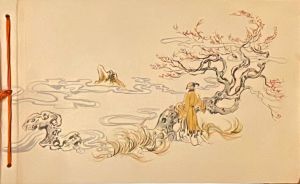Li Bai
Lí Bái → Li Bai (李白, 701–762)
Li Bai (früher im Deutschen bekannt unter dem Namen Li tai-pe), 701-762, bedeutender chinesischer Dichter der Tangperiode. Er wurde wahrscheinlich in Suyab (im heutigen Kirgistan) geboren und kam mit seiner Familie auch nach Tiaozhi im heutigen Afghanisten – beides Orte an der Seidenstraße, sein Vater war Händler. Später zog die Familie nach Jiangyou (Provinz Sichuan). Der schon zu Lebzeiten berühmte Dichter führte ein Wanderleben und lebte längere Zeit in der damaligen Hauptstadt Chang'an.
Wikipedia
Li Bai (chinesisch 李白, Pinyin Lǐ Bái, W.-G. Li Pai, klassisch Lǐ Bó bzw. Li Po; 701−762), gilt neben Dù Fǔ (杜甫) als der bedeutendste lyrische Dichter Chinas in der Tang-Zeit. https://de.wikipedia.org/wiki/Li_Bai
Li Bai (Chinese: 李白; pinyin: Lǐ Bái, 701–762), formerly pronounced Li Bo, courtesy name Taibai (Chinese: 太白), was a Chinese poet acclaimed as one of the greatest and most important poets of the Tang dynasty and in Chinese history as a whole. He and his friend Du Fu (712–770) were two of the most prominent figures in the flourishing of Chinese poetry under the Tang dynasty, which is often called the "Golden Age of Chinese Poetry". The expression "Three Wonders" denotes Li Bai's poetry, Pei Min's swordplay, and Zhang Xu's calligraphy. https://en.wikipedia.org/wiki/Li_Bai
Li Bai (chinois : 李白 ; pinyin : Lǐ Bái), né en 702, mort en 762), Li Po ou Li Bo (pinyin : Lǐ Bó), ou encore Li Taibai (chinois : 李太白 ; pinyin : Lǐ Táibái), son nom de plume, est un des plus grands poètes chinois de la dynastie Tang. https://fr.wikipedia.org/wiki/Li_Bai
Zum Namen
Li Bai's name has been romanized as Li Bai, Li Po, Li Bo (romanizations of Standard Chinese pronunciations), and Ri Haku (a romanization of the Japanese pronunciation). The varying Chinese romanizations are due to the facts that his given name (白) has two pronunciations in Standard Chinese: the literary reading bó (Wade–Giles: po2) and the colloquial reading bái; and that earlier authors used Wade–Giles while modern authors prefer pinyin. The reconstructed version of how he and others during the Tang dynasty would have pronounced this is Bhæk. His courtesy name was Taibai (太白), literally "Great White", as the planet Venus was called at the time. This has been romanized variously as Li Taibo, Li Taibai, Li Tai-po, among others. The Japanese pronunciation of his name and courtesy name may be romanized as "Ri Haku" and "Ri Taihaku" respectively.
He is also known by his art name (hao) Qīnglián Jūshì (青蓮居士), meaning Householder of Azure Lotus, or by the nicknames "Immortal Poet" (Poet Transcendent; Wine Immortal (Chinese: 酒仙; pinyin: Jiuxiān; Wade–Giles: Chiu3-hsien1), Banished Transcendent (Chinese: 謫仙人; pinyin: Zhéxiānrén; Wade–Giles: Che2-hsien1-jen2), Poet-Knight-errant (traditional Chinese: 詩俠; simplified Chinese: 诗侠; pinyin: Shīxiá; Wade–Giles: Shih1-hsia2, or "Poet-Hero"). https://en.wikipedia.org/wiki/Li_Bai
Pseudonym: Qīnglián Jūshì (青蓮居士, „Einsiedler vom Blauen Lotos“).
Beinamen: Shīxiān (詩仙, „Unsterblicher der Dichtkunst“); Jiǔxiān (酒仙, „Unsterblicher des Weins“).
Deutsche Ausgaben
- Li-Tai-Po: Gedichte aus dem Chinesischen. Übersetzt von Otto Hauser. Berlin: Duncker, 1911 (2. Aufl.) (Aus fremden Gärten 1)
- Gedichte nach den unsterblichen des Li-Tai-Po von Hans Schiebelhuth. Darmstadt: Darmstädter Verlag, 1948. unpag.
- Li-tai-pe. Nachdichtungen von Klabund. Leipzig: Insel. O. J. 26.-30. Tsd. / Leipzig 1951
- Li Tai-bo: Gedichte. Eine Auswahl. Übersetzung, Einleitung und Anmerkungen Günther Debon. Stuttgart: Reclam, 1962 / 1979
- Li Tai-peh. Poet's Corner 2. Ausgewählt von Ernst Schwarz. Berlin: Unabhängige Verlagsbuchhandlung Ackerstraße, 1991
